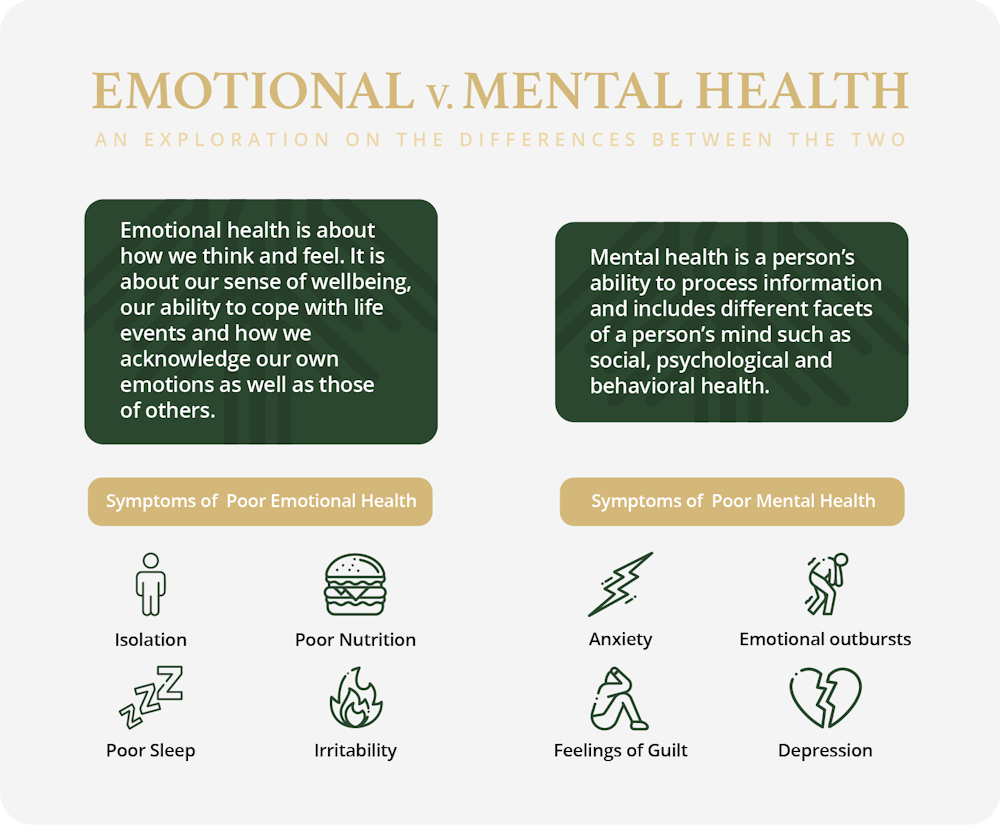Mental health awareness has steadily grown over the years in the US, so much so that the relevant statistics are readily available for reference. Data from the Substance Abuse and Mental Health Services (SAMHSA) indicates that as of 2022, at least 19.86% of American adults have one form of mental illness or another.
This figure translates to almost 50 million Americans. There is, however, little to no available data relevant to the state of emotional health in the United States, which is why very little is known about the prevalence of emotional health vs mental health issues.
At Eagle Creek Ranch Recovery in Nampa, Idaho, we provide people with recovery resources to help individuals learn how to effectively manage their emotional vs mental health.
How is Emotional Health Different from Mental Health?
Emotional Health
 Emotional health is the ability to discern what a person feels at a given moment or relevant to a situation or person. Moreover, emotional health is the ability to manage whatever feelings or reactions a person might have to a specific situation or person. The element of being able to manage the reaction to a situation or person is a hallmark of emotional health because there are many instances when a person could be fully aware of how they feel about something and yet be completely incapable of controlling how they react to it.
Emotional health is the ability to discern what a person feels at a given moment or relevant to a situation or person. Moreover, emotional health is the ability to manage whatever feelings or reactions a person might have to a specific situation or person. The element of being able to manage the reaction to a situation or person is a hallmark of emotional health because there are many instances when a person could be fully aware of how they feel about something and yet be completely incapable of controlling how they react to it.
This inability to control one’s emotions is not simply limited to intense emotions such as anger, but to other aspects of the emotional spectrum as well. People who are emotionally overwhelmed could also manifest as a person suddenly bursting into tears when they feel sad or going into hysterics when they feel frightened. The inability to control emotions is also displayed when a person behaves inappropriately or says inappropriate things to someone so they might feel a strong attraction.
Emotional health is generally linked to either how a person expresses or controls their emotions. Some express their emotions in a manner that many would consider unacceptable, while others display little to no emotion at all. Both of these polar opposites could be attributed to poor emotional health, with the person being unable to express their emotions in a manner that is considered acceptable.
Conversely, stifling one’s emotions is also considered to be unhealthy. This is because there is always a limit to how much certain emotions could be suppressed, and when a person’s threshold is passed, an emotional outburst is often the result, and will need to get treatments in our residential treatment center in Idaho. The danger here is that once the person finally erupts in an emotional outburst, their actions could have serious consequences, such as an emotional breakdown or lashing out blindly regardless of who they might hurt. Symptoms of poor emotional health include:
- Preference towards isolation
- Persistent feelings of low energy
- Unbalanced sleeping patterns (sleeping too much or too little)
- Unhealthy eating habits (eating too much or too little)
- Increased susceptibility to substance or alcohol abuse
- Uncharacteristic lethargy
- Inability to maintain healthy relationships
- Irritability
- Unexplained feelings of guilt
- Chronic feelings of hopelessness or worthlessness
- Neglecting self-care
- Sociopathic tendencies
- Inability to trust others
- Unexplained anxiety
- Uncharacteristic paranoia
- Persistent melancholy
- Types of depression
Mental Health
 Mental health is generally defined as a person’s ability to think and process information properly and includes different facets of a person, such as the psychological, social, and behavioral aspects. Mental health has a peculiarity that makes it both resilient and vulnerable at the same time. A person is said to have good mental health when they have the mental resilience that helps them get through difficult periods in life, turning these difficulties into learning experiences once they push past them.
Mental health is generally defined as a person’s ability to think and process information properly and includes different facets of a person, such as the psychological, social, and behavioral aspects. Mental health has a peculiarity that makes it both resilient and vulnerable at the same time. A person is said to have good mental health when they have the mental resilience that helps them get through difficult periods in life, turning these difficulties into learning experiences once they push past them.
The flip side of this is that a person’s mental health could display vulnerability when exposed to certain intense stimuli, such as trauma. Trauma is believed to be the greatest threat to a person’s mental health, as it could affect a person for a very long time if left untreated. Some forms of trauma could be so devastating to the person that their mind will seek a way to prevent the person from remembering it, but only to a certain extent. Certain triggers could awaken the trauma once more if the person is exposed to it, creating an adverse reaction in the person.
It is important to note that a person’s cognitive function is highly dependent on mental health. Mental health issues could severely affect elements of cognitive function that many people take for granted, including:
- Ability to learn
- Being able to remember things
- Being able to understand both basic and complex concepts
- Lateral thinking (being able to approach and solve a problem in multiple ways)
- Ability to focus and concentrate
- Reasoning Ability
- Rational thought
- Critical thinking
- Perception
- Sound judgment
- Ability to organize information
Similar to how the body gets stronger with physical exercise, a person’s mental health also improves with mental exercises that allow a person to engage in deep and challenging thought. The most common examples of this are thought experiments, where hypothetical situations are laid out for a person to think through and deduce a possible outcome, or simply figure out how it all plays out.
Is Awareness of One’s Emotional and Mental Health Important?

A person’s emotional or mental state is utterly important to the person, the people immediately around the person, and even those the person might be exposed to moving forward. This is because a person’s mental and emotional health would dictate how they interact and communicate with others, and how they react to specific scenarios they encounter.
A person with mental or emotional health issues could have a completely unexpected and inappropriate reaction to something that someone else might have said or done, regardless of the context of the words or actions involved. A completely innocent comment, observation, or gesture could be taken the wrong way by someone who is not in good mental or emotional health, to which others might think the person is only “overreacting”, as they do not know that the person has a mental or emotional health issue at the time.
It is not uncommon for people who have mental or emotional health issues to get in serious trouble because of their adverse way of thinking or expressing their emotions. There are instances where a person who was simply “having a bad day” ended up with the person being taken to either the hospital or the police station, mainly due to what they did while being influenced by mental or emotional health issues. This would usually involve making bad judgments, taking unnecessary risks, or saying the wrong things to the wrong people at the worst time possible.
Mental and emotional health concerns are also why people who work in law enforcement and the armed forces are required to periodically consult with a therapist, as a moment of bad judgment for someone who is usually armed with a weapon could result in injury or something far worse for those around them.
What are the Signs of Emotional Health vs Mental Health Issues?

The worst thing that a person could do relevant to mental or emotional health is to take these two things for granted. Many people mistakenly think that mental or emotional issues will simply just “go away” given enough time or if they ignore or stifle them. This is never the case because mental and emotional health issues tend to become worse or “festering”, becoming an even bigger problem when it leads to uncontrollable reactions or illogical thoughts.
One of the best examples of this is seen in people who suffered from bullying at some point in their lives. There are many instances of people who were bullied and never had the opportunity to have their issues addressed who later on developed a violent personality, anger management issues, or became bullies and abusive people themselves. The bullying they suffered greatly affected their mental and emotional health to the point that they failed to recognize how much they were affected by it.
Another example is seen in people who suffer from post-traumatic stress disorder (PTSD). These are often people who have seen the horrors of combat, were exposed to acts of crime, or suffered some terrible injury or accident. In many cases, the physical effects of being exposed to these things might heal and go away with time, but the mental and emotional effects could stay on for much longer. Combat veterans have been known to take to drinking or even substance abuse just to deal with the mental and emotional scars left by PTSD.
There is Hope for Better Emotional Health vs Mental Health at Eagle Creek Ranch
Feeling hopeless all the time or being plagued by persistent unhelpful thoughts will take a heavy toll on anyone. This is mostly why people fall into desperation or resort to actions that they are certain to regret later on. We know this here at Eagle Creek Ranch because, our dual diagnosis treatment center in Idaho helps people who suffer from these things and more, but the good news is that we have helped them through the worst of it and to a lasting recovery. There is hope for better mental and emotional health. All it takes is for someone to care enough. We care enough to help you. Talk to us now.

Clinical Director
Kendall Maloof is the clinical director at Eagle Creek Ranch Recovery. She is a licensed marriage and family therapist and has held multiple leadership roles before settling here at Eagle Creek. Kendall received her master’s degree in marriage and family therapy from the Chicago School of Professional Psychology in 2016. Her career in mental and behavioral health began in 2014 when she took up internships in both the nonprofit and for profit sectors. She interned at multiple reputable companies, such as The Living Success Center and 449 Recovery in California.
In 2019, Kendall became the clinical director of Sunsets Recovery for Woman, a dual diagnosis program in southern California. Kendall is a natural leader. She has an incredible ability to problem solve and stay calm in any situation. Kendall never fails to show up when she is needed, and her calm demeanor makes her team and clients feel at ease. Eagle Creek Ranch Recovery is proud to have Kendall as our clinical director.



